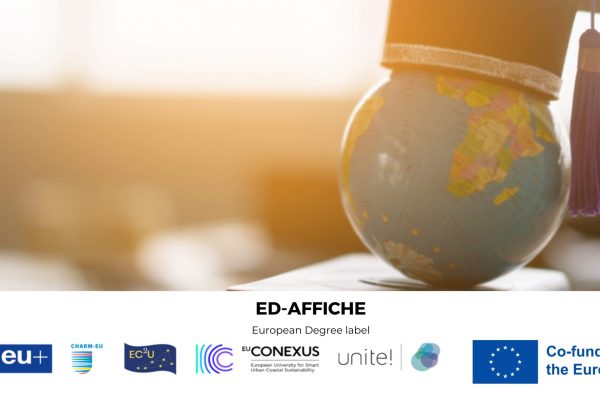In today’s rapidly evolving world, the higher education landscape is undergoing a transformation, evolving to address future challenges through innovation, collaboration and the cultivation of global perspectives.

As part of this transformation, the European Commission announced 10 pilot projects to explore the potential for a joint European Degree Label, an innovation that would strengthen and consolidate the European Higher Education Area (EHEA). The ED-AFFICHE project offers universities, European University Alliances and other associated partners a significant opportunity to contribute to the advancement of higher education across Europe.
Shaping the European Degree Label
At the heart of the ED-AFFICHE project lies a profound opportunity for stakeholders to shape the criteria of a joint European Degree Label. Our consortium of universities, quality assurance agencies, employers, student communities and other educational organisations brings together expert perspectives from across Europe to jointly develop recommendations for the implementation of the European Degree Label. This collaborative approach will ensure that the European Degree Label will accurately reflect the needs of today’s higher education landscape.
A powerhouse consortium of leading European University Alliances
The strength of the ED-AFFICHE project lies in its consortium, comprising six leading European University Alliances: Una Europa, 4EU+, CHARM-EU, EC2U, EU-CONEXUS, and Unite! Such unprecedented collaboration between alliances provides a unique platform for universities to work in partnership, together charting a course that encompasses the expertise and insights of 51 higher education institutions across 22 countries. Such an extensive consortium ensures a rich diversity of perspectives and experiences. ED-AFFICHE members can not only contribute their insights but also build collaborations, fostering a comprehensive approach to addressing broader challenges and opportunities within the EHEA.
Endorsed by European authorities
Supported by the European Commission and backed by 18 national and regional higher education ministries, the ED-AFFICHE project has garnered significant support from key stakeholders. Additionally, 15 national accreditation and quality assurance agencies have given their support, reinforcing the importance of the project and ensuring our outcomes align with key stakeholders of policymakers across the EHEA..
Promoting the exchange of best practices
The sharing of best practices between universities, ministries, and quality assurance agencies is central to the success of the ED-AFFICHE project. This championing of open dialogue enables project members to gain insights and learn from their peers, facilitating a shared environment where all can flourish. By actively contributing to this open dialogue, participants drive progress in the EHEA and foster a collective commitment to educational excellence.
Driving the EHEA forward
ED-AFFICHE is all about enhancing and advancing the EHEA. By actively engaging in discussions, proposing recommendations, and collaborating with a wide range of institutions and organisations, participants play a key role in shaping the future of higher education in Europe.
The ED-AFFICHE project represents a transformative opportunity for universities, European University Alliances, and other key stakeholders to shape Europea’s higher education landscape. With our collaborative ethos, mutually-beneficial partnerships, and commitment to engaging with diverse perspectives, the project and its consortium epitomises the transnational collaboration and innovation needed to advance the EHEA and ensure we are equipped to face the challenges of tomorrow.